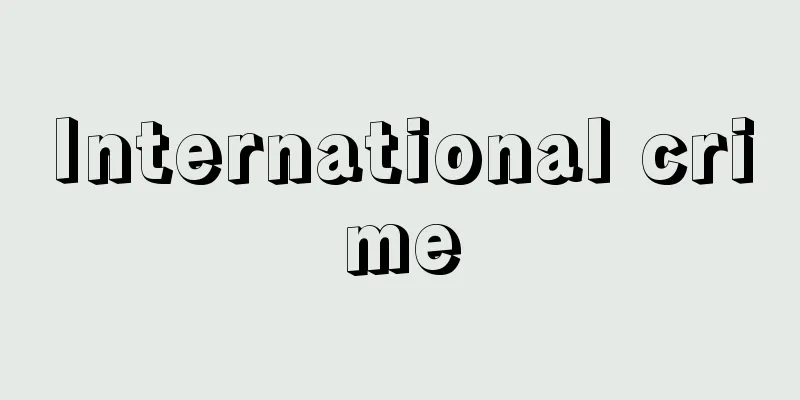International crime

|
The term "international crime" is used in four different ways. First, when a criminal or criminal act spans multiple countries, it can be called an international crime. In this case, since it is a crime under each country's domestic law (criminal law), each country will police and punish the crime on its own, but international cooperation may also take place through the International Criminal Police Organization. Secondly, crimes that have a special effect under international law, such as piracy, slavery, and drug trafficking, are sometimes called international crimes. For example, piracy has long been considered a "common enemy of mankind," and while states are normally not permitted to exercise public authority on the high seas except against their own ships and aircraft, international law allows any state to capture and bring to its own country pirates, regardless of whether the ship is one of its own or not, and punish them. Unlike other crimes, these crimes have a special effect under international law. However, the punishment itself is carried out by each state applying its domestic law, not by an institution of the international community. Thirdly, wars of aggression in particular are sometimes referred to as international crimes. For example, the preamble to the Geneva Protocol (which never went into effect) adopted by the League of Nations General Assembly in 1924 confirmed that wars of aggression are a violation of solidarity and an international crime, and Article 5 of the resolution "Definition of Aggression" adopted by the UN General Assembly in 1974 stipulates that "War of aggression is a crime against international peace. Aggression shall incur international responsibility." It can be said that it is a common legal conviction among countries that wars of aggression are national crimes and may be subject to international sanctions. In that sense, wars of aggression in particular are sometimes referred to as international crimes. Fourthly, crimes punishable by international procedures are called international crimes. After World War I, the Treaty of Versailles stipulated that the former German Kaiser Wilhelm II should be punished by a special court, and after World War II, the Allied Powers established the International Military Tribunal in Nuremberg and the International Military Tribunal for the Far East in Tokyo to punish German and Japanese war leaders, but these were held responsible for crimes of aggression, crimes against peace, and crimes against humanity. The Genocide Convention, which came into force in 1951, not only stipulated that perpetrators of genocide should be punished by domestic courts in the country where the crime was committed, but also planned to establish an International Criminal Court to punish them through international procedures, but in reality, the establishment of the International Criminal Court was not easy. However, a treaty to establish the court was adopted at an intergovernmental diplomatic conference held in Rome in 1998 based on the draft Statute of the International Criminal Court prepared by the United Nations International Law Commission. This established a system for international punishment of serious international crimes committed by individuals. In addition to the crime of genocide, crimes against humanity, war crimes and the crime of aggression are punishable as core crimes. [Yasuo Ishimoto] "Taijudo Kanae, "The Concept of International Crime and the Position of International Law" (Jurist, No. 720, 1980, Yuhikaku) [References] | | | | |Source: Shogakukan Encyclopedia Nipponica About Encyclopedia Nipponica Information | Legend |
|
国際犯罪ということばは4通りの意味に用いられる。第一に、犯罪人や犯罪行為が複数の国にまたがっている場合に、これを国際犯罪ということがある。この場合は、それぞれの国内法(刑法)上の犯罪であるから、それらの国家が独自に取締りや処罰を行うが、国際刑事警察機構を通じて国際協力の行われることもある。 第二に、海賊行為、奴隷売買、麻薬取引のように、国際法上、特殊な効果をもつ犯罪を国際犯罪ということがある。たとえば海賊行為は古くから「人類共通の敵」とみなされ、通常ならば国家は公海上では自国の船や航空機に対する以外には公権力を行使することはできないにもかかわらず、海賊については、いずれの国家も、自国の船であると否とにかかわらず、これを捕らえて自国に連行して処罰することが国際法上で認められている。他の犯罪と異なり、これらの犯罪は国際法上で特殊な効果をもっているわけである。もっとも、処罰そのものは、それぞれの国家が国内法を適用して行うのであって、国際社会の機関が行うわけではない。 第三に、侵略戦争をとくに国際犯罪ということがある。たとえば、1924年に国際連盟総会で採択されたジュネーブ議定書(発効せず)の前文では、侵略戦争が連帯関係の侵害および国際犯罪であることを確認し、74年に国連総会で採択された決議「侵略の定義」の第5条は「侵略戦争は国際平和に対する罪である。侵略は国際責任を生ずる」と規定している。侵略戦争が国家の犯罪であり、国際的制裁の対象となりうることは諸国の共通の法的確信であるといってよい。その意味でとくに侵略戦争を国際犯罪ということがある。 第四に、国際的手続で処罰の行われる犯罪を国際犯罪ということがある。第一次世界大戦後、ベルサイユ条約が、前ドイツ皇帝ウィルヘルム2世を特別裁判所で処罰すべきことを定め、また第二次世界大戦後、連合国がニュルンベルクで国際軍事裁判所を、東京で極東国際軍事裁判所を設け、ドイツや日本の戦争指導者を処罰したが、これらは侵略に対する罪、平和に対する罪、または人道に対する罪の責任を問うものとされた。1951年に発効したジェノサイド条約は、集団殺害罪について、犯罪人を行為地の国内裁判所で処罰すべきものとするだけでなく、国際的手続での処罰のため国際刑事裁判所の設置を予定していたが、実際には設置は容易に実現しなかった。しかし、その後国連国際法委員会の作成した国際刑事裁判所規程草案に基づき98年ローマで開かれた政府間外交会議で同裁判所の設立のための条約が採択された。これにより、個人の重大な国際犯罪を国際的に処罰する制度が樹立された。そこでは、集団殺害罪のほか、人道に対する罪、戦争犯罪および侵略の罪が、コアクライムcore crime(犯罪のなかの犯罪)として処罰の対象とされている。 [石本泰雄] 『太寿堂鼎「国際犯罪の概念と国際法の立場」(『ジュリスト』720号所収・1980・有斐閣)』 [参照項目] | | | | |出典 小学館 日本大百科全書(ニッポニカ)日本大百科全書(ニッポニカ)について 情報 | 凡例 |
<<: International Organization for Standardization
>>: International Bureau of Weights and Measures
Recommend
MFPM - Multi-Functional Power Meter
…A holding company for Manufacture Française des ...
Daisuke Namba
An anarchist of the Taisho period. The perpetrato...
Junpachi Kasai
Year of death: December 31, 1919 Year of birth: Te...
Metric space
If a positive number ρ( x , y ) can be defined for...
accounts receivable
It is recorded in the assets section of the debit ...
Eton Fives
…It is a simple game played in England from ancie...
Uwaen
...The seats of those appearing in court differed...
Schweitzerland
...On the other hand, another meaning of fire fes...
confection tout fait (English spelling) confectiontoutfait
...With excellent university specialized courses,...
Trim-aksjon (English notation) Trimaksjon
…It means physical fitness. The original meaning ...
Mars - Mars (English spelling)
An ancient Roman god of war, later identified wit...
Gattendorfia
…The name of the period was derived from this fac...
Grass dumplings - Grass dumplings
…The other is made by grinding boiled mugwort and...
Kinmeireigakkai - Kinmeireigakkai
...After many mystical experiences, he began miss...
Cardiology - Cardiovascular
It is also called cardiology. It was differentiate...


![Sasayama [town] - Sasayama](/upload/images/67cbaaae54807.webp)






